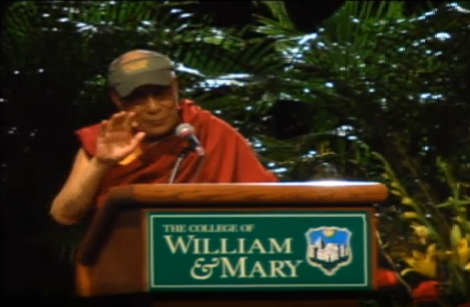The Dalai Lama in Williamsburg
I had the opportunity last week to see the Dalai Lama speak in Williamsburg. He’s currently making a tour of small colleges and he was appearing at William and Mary, where my daughter is a student. It made for a delightful visit. Tickets for the event had sold out within 15 minutes. More than eight thousand people attended. The line into the arena began two and a half hours before the event—and these were all people with tickets. So interesting. The student who introduced him said we would likely remember this day for the rest of our lives. I loved that he marked the gravity of the moment. The student handed the Dalai Lama a green William and Mary visor, which the Dalai Lama promptly placed on his head to loud applause. He then placed a white scarf around the student’s neck and proceeded to wear the visor for the remainder of his talk. It was a lovely beginning—and a wonderful way to undercut the gravity with a sense of lightness. The Dalai Lama greeted us as brothers and sisters. He made a point that people make too much of secondary differences like status. He then began by emphasizing that we are entering a new reality which is going to require a new kind of thinking. His main emphasis was, not surprisingly, on the need for compassion. But there was a teaching here that I hadn’t heard in quite this way before. He made a sharp distinction between animal compassion and human compassion. All animals have compassion toward their young and those whom they have a positive connection with. Human compassion gives us the intelligence to extend our compassion—beyond our families and our groups. He repeated over and over that it’s a mistake to think that this compassion is primarily for the benefit of others. This compassion is first and primarily of benefit to ourselves. How our compassion is received is beyond our control—and not our business. A person might respond negatively because of their mind but we shouldn’t be afraid of that or pretend because of that. Compassion helps us. It benefits us. It changes us. He told a story about Cuban refugees who he met who were praying for Castro. They were praying that he would die and go to heaven. This story made the Dalai Lama laugh quite a bit. He seemed to be approving of their skillfulness in this prayer—that they had managed to extend compassion under difficult circumstances. He laughed often during his presentation, as if so much of what he said tickled him. He made a sharp distinction between actions and actors. We can believe, he said, that an action is wrong and still care and feel compassion toward the actor. He told about meeting George Bush. (I believe he meant the son, George W.) He talked about feeling such a good sense of friendliness. He called him his friend, and went on to say he approved of his motivation, wanting to spread democracy. “But not his method—force.” He went on to say that violence has unintended consequences. He was very clear that one could disapprove of a person’s action and still call that person friend. He was gracious throughout. He received at least 3 standing ovations. He thanked us for being attentive....
read more
